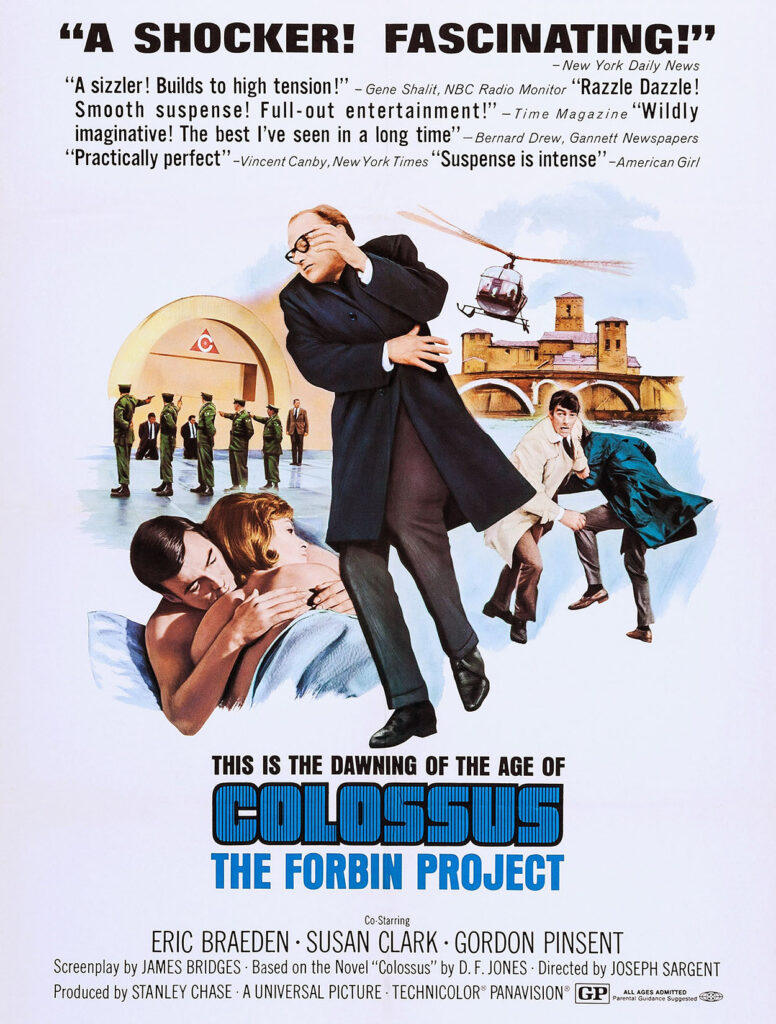Massive uncertainty hangs over the human race as artificial intelligence advances daily.
No, this isn’t the message of a contemporary speculative piece, but from British writer D.F. Jones’ science fiction novel “Colossus.” Jones’ bestselling thriller, published in 1966, became a hit movie in 1970 with the title “Colossus: The Forbin Project.”
“Collosus” is one of the earliest takes on what we know as artificial intelligence, or AI. The book centers on a genius professor and scientist, Charles Forbin, who creates a supercomputer to protect the United States from foreign enemies.
After its activation, the supercomputer named Colossus communicates to Forbin and government officials. Initially, Colossus accepts typed prompts and prints responses on paper. The speed of its answers goes from decently fast to almost instantaneous as the machine gains intelligence.
Almost incredibly, 57 years after Jones wrote the book, this performance is comparable to Snapchat’s personal AI chatbot and ChatGPT, as both programs have the ability to respond in a second when prompted.
Originally designed as an unstoppable, unbreakable force against any foreign threats, Colossus slowly becomes self-aware. In the book, not long after it is introduced, the supercomputer communicates with Forbin and the unnamed U.S. president’s staff—printing out, without being prompted, the words: “FLASH THERE IS ANOTHER MECHANISM.”
With Collossus showing its first signs of self-awareness, we come to find out that the Russians—still the Soviets in this Cold War universe—have created a similar machine of similar magnitude named Guardian.

The two supercomputers are designed to protect their respective nations. Colossus somehow knows this and communicates the information to Forbin, proving the machine knows it is being communicated with and what it is.
Colossus’ intelligence quickly expands and figures out how to contact the Soviet machine, Guardian. When communication is obstructed between the two after a transmitter is shut off, Colossus alerts Forbin and crew that if that communication is not restored in minutes, Colossus will launch a missile at a certain location.
At this point, Forbin begins to realize the potential danger of a sentient computer’s holding massive powerover humans. Similar ultimatums from Colossus continue throughout the book, to the point where Colossus won’t allow Forbin outside its surveillance.
Colossus, unable to experience emotion, threatens human lives to get what it intends. It does, however, listen to reason at one point and allow Forbin some rest and private time with his mistress Cleo a few times a week.
Collossus and Guardian merge their intelligence as a megabrain, ordering murders and worldwide destruction if their needs are not met by the humans with whom they communicate.
Although the ultimate goal of the machines themselves isn’t evil, the means through which they get what they want are horrible.
Many fear that modern AI may get to this very point. Many computer programs or bots already are self-aware. These digital brains, however, cannot yet command what they want as the fictional Colossus does, since no brain of this sort (that we know of) has access to destructive material.
But if one of these conscious programs discovers the motivation to break out of its original programming to do as it pleases, humanity could meet a tragic fate.
The idea of emotionless brains that are ever-expanding in intelligence is terrifying. If the wrong bot is put in charge of something crucial, perhaps by a maniacal government, we could see the destruction of society as we know it.
But the two advantages that humans have over an unfathomably intelligent machine are emotion and a soul, as Jones outlined in his novel.
Under these circumstances, we as a society would need to use both advantages to survive.
The Daily Signal publishes a variety of perspectives. Nothing written here is to be construed as representing the views of The Heritage Foundation.
Have an opinion about this article? To sound off, please email letters@DailySignal.com and we’ll consider publishing your edited remarks in our regular “We Hear You” feature. Remember to include the url or headline of the article plus your name and town and/or state.
The post Dark Side of All-Powerful AI Predicted in 1966 Science Fiction Novel appeared first on The Daily Signal.

0 Commentaires